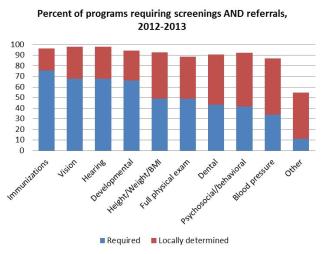
Healthy preschool habits can last a lifetime
January 30, 2015
By the end of January, gyms are slowly becoming less crowded, as many adults give up on their resolutions to lose weight or get in shape. But a healthy weight and staying active remain important for all ages throughout the year. January 30 is National Preschool Health and Fitness Day, underscoring the importance of beginning healthy habits early in life.
Child obesity remains a daunting problem in American society, as it can set children up for health problems beginning in early childhood. Data from the Centers for Disease Control in 2013 reported that 1 in 8 preschoolers was obese, and that children who were obese or overweight in preschool were five times more likely than normal-weight peers to grow into obese or overweight adults. A recent limited study of 44,000 preschool-aged children found that overweight and obese children in Head Start were more likely than children not enrolled to slim down. The study also found that children entering the program who were underweight were more likely to reach a healthy body weight during the program year. Because of how the study was structured– instead of having a control group, the Head Start children were compared both to children in low-income families receiving Medicaid, as well as to higher-income families with private insurance. This study does not pinpoint a specific reason why Head Start is effective in helping children reach a healthy weight, but it does add to a growing body of literature on the important role early childhood education plays in health and fitness.
Early childhood education programs can play an important role in providing families with resources and information to support healthy habits. Based on data from the 2012-2013 school year, state-funded pre-K programs prioritize screenings for healthy weight among many other aspects of health. About half of state-funded pre-K programs require at the state level that programs screen students height/weight/BMI, with another 43 percent allowing programs to decide locally whether to track this information.

In a separate survey question, administrators indicate the 62 percent of programs provide child health services as part of their comprehensive services; 43 programs also reporting providing nutrition information, beyond the offering of healthy meals. These services provide an important opportunity to start a conversation with children and families about healthy habits that can last a lifetime. A NIEER policy brief explores the importance of addressing health in preschool programs as well as the positive impacts such programs can have on children’s long-term health and development.
There has been no shortage of efforts to increase awareness of healthy habits in early childhood education. The First Lady has made fighting childhood obesity a key area of her public profile through the Let’s Move! Campaign. Sesame Street provides resources for families as well as child care and education providers on both how to incorporate exercise into early day life and how to empower children to make healthy food choices.
-Megan Carolan, Policy Research Coordinator
About NIEER
The National Institute for Early Education Research (NIEER) at the Graduate School of Education, Rutgers University, New Brunswick, NJ, conducts and disseminates independent research and analysis to inform early childhood education policy.
